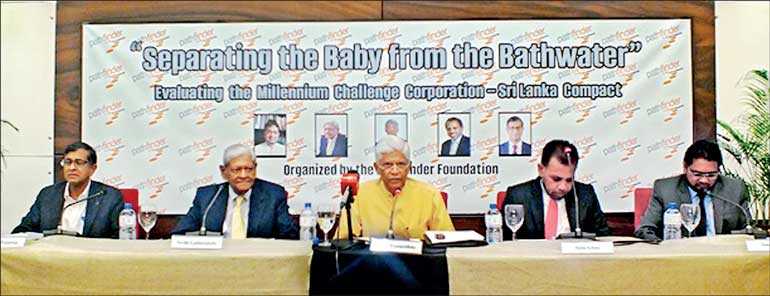Monday Mar 02, 2026
Monday Mar 02, 2026
Wednesday, 28 August 2019 00:00 - - {{hitsCtrl.values.hits}}

The Pathfinder Foundation (PF) suggests that the President summon an early meeting of the Prime Minister, Leader of the Opposition and other relevant political stakeholders and take a final decision on how Sri Lanka should proceed with the Compact with Millennium Challenge Corporation (MCC) after taking into consideration all the implications, benefits and costs.
Much of the news about the $ 480 million MCC Compact with Sri Lanka, an outright grant not a loan, has been based on hearsay and rumour. Due to paucity of information, opinions seem to have been formed and conclusions drawn on the projects that will be funded under the Compact.
During the run up to national elections, partisan bickering will dominate the agenda and ‘noise rather than sense’ will prevail. It is up to the national leadership, both in Government and Opposition, to discern between the substance and the shadows of this important issue, PF says in statement.
To help rectify this situation, the PF convened a panel discussion recently on the MCC program that sought to shed light on the MCC program for the benefit of the public.
As a result of the dialogue and information-sharing that was catalysed through this event, the PF has concluded that while the MCC program may not be perfect – we have some “quibbles” as one panellist said – and can be improved during the project design phase, we should not throw out the baby with the bathwater. For the sake of the country, the distinguished panellist who said “Sri Lanka never misses an opportunity to miss an opportunity” must be proven wrong.
The MCC program addresses two binding constraints to economic growth – weaknesses in transport infrastructure and land administration systems. Compact development teams of successive Sri Lankan Governments and MCC sector specialists had extensive stakeholder engagements with the line ministries and departments responsible for transport and land administration, the private sector, think tanks, and civil society organisations.
The project negotiations commenced in 2004 under Kumaratunga - Wickremesinghe tenure and continued during the Rajapaksa Government until termination of the project by MCC 2008, due to escalation of the conflict situation in the island. The present Compact is based on a full-fledged proposal submitted by the Government in November 2017.
The PF understands that Sri Lanka completed negotiations with MCC in October 2018 and the Government negotiation team was led by Secretary to the Ministry of Finance. The team included senior Government officials from the External Resources Department, Attorney General’s Department, Policy Development Office in the Prime Minister’s Office, Ministry of Highways and Road Development, Ministry of Lands and Parliamentary Affairs, Ministry of Megapolis and Western Province Development, Ministry of Transport and Civil Aviation, and Sri Lanka Survey Department.
The agreement was to be signed in December 2018 but was delayed due to unforeseen political events in Sri Lanka around that time. The MCC Board of Directors approved the Compact at its Board meeting in April. The final step would be approval of the Compact by our Cabinet of Ministers and signing of the grant agreement by the Government.
Sri Lanka has just graduated to upper-middle-income status and MCC historically partners only with low and lower-middle-income countries. It is learnt that MCC’s Board of Directors next due to meet in mid-September and may determine to disqualify Sri Lanka, if the country doesn’t appear to want or need the $ 480 million grant. Against this scenario, the Government should take a decision on its stand on the Compact as a matter of priority.
In the final analysis, it must be stressed that the PF does not wish to advocate as to whether Sri Lanka should accept the MCC grant or not. Any sovereign nation has every right or even obligation to turn down foreign assistance, if there is reasonable suspicion that this support is not in the interest of the country.
However, because any decision taken in this regard will affect present and future generations, it is extremely important that this decision be made on an informed and well considered basis through a politically inclusive process. During the run up to national elections, partisan bickering will dominate the agenda and ‘noise rather than sense’ will prevail. It is up to the national leadership, both in Government and Opposition, to discern between the substance and the shadows of this important issue.
Hence, the PF suggests that the President summon an early meeting of the Prime Minister, Leader of the Opposition and other relevant political stakeholders and take a final decision on how Sri Lanka should proceed with the Compact with Millennium Challenge Corporation.